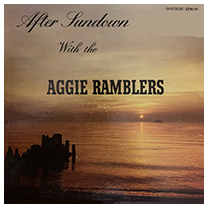 The Aggie Ramblers "After Sundown With The Aggie Ramblers" (Goldust Records, 19--?) (LP)
The Aggie Ramblers "After Sundown With The Aggie Ramblers" (Goldust Records, 19--?) (LP)
(Produced by Emmit Brooks)
A long-running New Mexico band co-founded by Goldust label owner Emmit Brooks, the Aggie Ramblers played a mix of country and western swing, making numerous recordings, including singles backing Nolan Chandler and other singers. Bass player Brooks led the Aggies from 1957 to 1975, while his younger brother Jake played with the band off and on throughout the '60s and early '70s. The band also included musicians such as Bill Bailey and steel player Larry Dennison -- the group toured extensively in New Mexico and West Texas and fostered many local musicians over the years. This edition of the band includes Bailey, Brooks and Dennison, along with Jim Hill on guitar and piano player Jerry Miller, with various members singing lead vocals and a couple of instrumental tracks, one showcasing Dennison on a version of Pete Drake's "Midnight In Old Amarillo" and another with Bailey taking the lead on a vamped-up version of "Bile Them Cabbage Down." There are also some original songs, including "Fire Of Love" by Brooks and "Blues At Midnight," a duet by Miller and Hill.
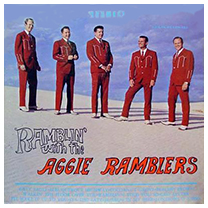 The Aggie Ramblers "Ramblin' With The Aggie Ramblers" (Goldust Records, 19--?) (LP)
The Aggie Ramblers "Ramblin' With The Aggie Ramblers" (Goldust Records, 19--?) (LP)
(Produced by Emmit Brooks)
A nice, low-key set mixing oldies such as Rex Griffin's "Last Letter," "Bubbles In My Beer," and Ernest Tubb's "Walking The Floor Over You," with a healthy dose of originals. Emmit and Jake Brooks each contribute a couple of songs, as does fiddler Junior Daugherty. You can hear their dance-band roots, particularly with their affinity for old western swing tunes, though these guys are also pretty laid-back, with a laconic style that might appeal (in retrospect) to fans of Jimmie Dale Gilmore. Calm, confident, old-school country from some young guys with a strong sense of tradition. Recommended!
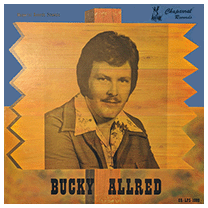 Bucky Allred "Bucky Allred" (Chaparral Records, 1977) (LP)
Bucky Allred "Bucky Allred" (Chaparral Records, 1977) (LP)
(Produced by Scott Turner)
A humble honkytonker from Glenwood, New Mexico, Bucky Allred started playing music while going to college, back in the early 1970s. He later made the move to Albuquerque around 1975, using the city as his base of operations while he toured regionally in his home state, as well as in Colorado and Texas. In the early '80s Allred gave Nashville a shot and released a string of singles though after a few years he headed back to Albuquerque and cut a few more singles on local indie labels. In 1993 he bought the Blue Front Cafe and settled down in Glenwood, finally hanging up his music biz spurs for several years before signing up as The Delk Band's bass player sometime around 2005. As far as I know this is his only album, though it includes a lot of original material, including his own "Rx-All Ranger," which came out as a single the year before. Bucky Allred had some interesting musical connections, recording tunes by Billy Eustis, Bobby Fisher and others, and was in music promoter Little Richie Johnson's orbit as well. He had at least one of his singles -- on the Bluefront label -- engineered by the legendary Norman Petty, though it's possible this was an older recording, since Petty died in 1984. Mr. Allred also got into local politics, and ran for country commissioner a number of times, while hosting a big community party from time to time, to build up good will.
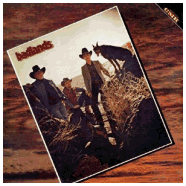 Badlands "Badlands" (CMH Records, 1981) (LP)
Badlands "Badlands" (CMH Records, 1981) (LP)
A fairly lackluster album with an interesting pedigree... The artless arrangements and blaring electric guitars are, perhaps, an odd match for the traditionally-oriented CMH label, although picker-producer John Wagner and likeminded cohorts such as Mose McCormack were apparently trying to drag the label into the modern era, or something like that. I'm not a fan of the results, but I guess this may be of interest to those less stodgy than I. Wagner was a native of Clovis, New Mexico who got into record producing in the '70s, and helped cut some latter-day albums by country icons Joe Maphis and Merle Travis: they both pitch in on this LP, as does Rose Maphis. The rest of the group included Zen Crook on banjo and fiddle, Jackson D. Kane (bass), Andrew Poling (drums), Jim Siegling (rhythm guitar) and Mark Siegmeister on drums... Not my cup of tea.
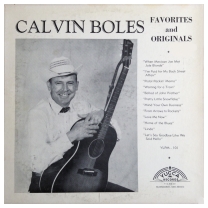 Calvin Boles "Favorites And Originals" (Yucca Records, 1960-?) (LP)
Calvin Boles "Favorites And Originals" (Yucca Records, 1960-?) (LP)
(Produced by Calvin Boles)
A true legend of New Mexico's music scene, Alamagordo entrepreneur Calvin Boles was an insurance agent by day and kooky country singer at night. He started his own label in 1958, Yucca Records, which became one of the Southwest's best-known indies, recording rockabilly singers such as Bobby Fuller and Jerry Bright, as well as numerous obscure country artists, the best known of which was probably Al Sims. In addition to releasing over two hundred singles on the Yucca label, Boles recorded eight albums under his own name, backed by his band, the Rocket City Playboys which included his wife Betty on bass. This first album was an even mix of cover tunes and originals -- though of modest talent both as a performer and composer, Boles was a prolific songwriter and sang with a jovial air, even if his voice was kind of thin. He sings classics by Al Dexter, Jimmie Rodgers, Hank Williams and Ernest Tubb, alongside his own heartsongs and novelty numbers. A couple of the tracks on this album are regional pride songs as well as topical tunes: on "From Arrows To Rockets" cheerfully outlines Alamagordo's history as the site where the first atomic bomb was developed and tested, while "Ballad Of John Prather" takes this patriotic fervor and turns it on its head, telling the story of how one local rancher defied the government's use of eminent domain and kept on his ranch even after Alamagordo became a full-time rocket testing site. The other songs are straight-up country and although Calvin Boles was not a powerful singer, this album resonates with authenticity and good cheer. Good, solid picking by Bill Chappel (bass), Junior Daugherty (fiddle), Elmo Davis (steel guitar), Jimmy Furlow (rhythm guitar), Jim Temple (lead guitar), Calvin Turbeville (steel), and Jim Cooper playing bass on one track, a Boles original called "From Rockets To Arrows." Definitely worth checking out.
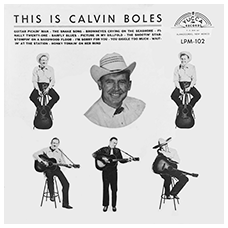 Calvin Boles "This Is Calvin Boles" (Yucca Records) (LP)
Calvin Boles "This Is Calvin Boles" (Yucca Records) (LP)
(Produced by Calvin Boles)
This was his second album, and features an all-original slate of songs, most of which are purely his, along with a couple co-written with friends. There's a lot of novelty material, including "Guitar Pickin' Man," "Finally Twenty-One" and "You Giggle Too Much," which he also released as a single. One track, "The Snake," features a long narration where Boles talks in a faux-Latino accent (weech I theenk ees a leetel painful to heeere now, een our enlightened age of thee future...) but other than that one unintentional misfire, this is a good set of rugged, authentic desert-country honkytonk. Boles still wasn't that great a singer, but there is a certain naif-art purity to his songs which will resonate with fans of old-school twang. The liner notes are great, too, that kind of heart-on-the-sleeve, TMI sort of thing where amateur musicians talk in great detail about their lives -- how he was born in Seymour, Texas, where he went to school, how he worked as a shoe shine and a milk delivery boy as a kid, went into the Army, etc. Boles closes by saying his one great wish is to have a national hit, and while that never happened, he sure made some fun records along the way.
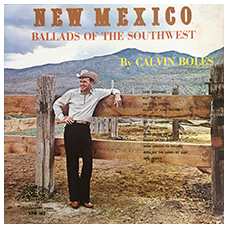 Calvin Boles "New Mexico: Ballads Of The Southwest" (Yucca Records, 1963-?) (LP)
Calvin Boles "New Mexico: Ballads Of The Southwest" (Yucca Records, 1963-?) (LP)
(Produced by Calvin Boles)
A fairly goofy album of regionally themed songs, all Calvin Boles originals, ranging from western ballads and gunslinger songs to atomic age and UFO novelty numbers. Several tracks are reprised from earlier albums (though I think these are new recordings) including "From Rockets To Arrows," "Ballad Of John Prather" and (unfortunately) "The Snake Song." The musicians are familiar as well: Calvin Boles of harmonica and vocals, Jim Cooper (fiddle), Elmo Davis (steel guitar), Bill Gross Jr. (drums), Bob Prather (mandolin), Bill Talley (bass), and Jim Temple on lead guitar... The accompaniment is decent, though not as solid on his first album; the novelty factor seems to undercut Boles as a singer, though it is distinctive and unusual material. Worth a spin, for sure.
 Calvin Boles "Nine Months To Live" (Yucca Records, 19--?) (LP)
Calvin Boles "Nine Months To Live" (Yucca Records, 19--?) (LP)
 Calvin Boles "Country Dozen" (Yucca Records, 19--?) (LP)
Calvin Boles "Country Dozen" (Yucca Records, 19--?) (LP)
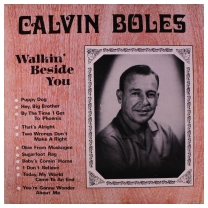 Calvin Boles "Walkin' Beside You" (Yucca Records, 19--?) (LP)
Calvin Boles "Walkin' Beside You" (Yucca Records, 19--?) (LP)
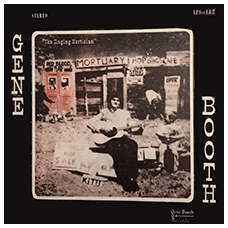 Gene Booth "The Singing Mortician" (Gene Booth Records, 19--?) (LP)
Gene Booth "The Singing Mortician" (Gene Booth Records, 19--?) (LP)
(Produced by Emmit Brooks)
A double album, an oddball offering delving even deeper into Mr. Brook's musical fancies... He was living in Deming, New Mexico when this came out, and apparently had actually worked for a couple of years at a mortuary by the time he recorded these sessions. Once again, he's backed by the Goldust studio crew, including pianist Harry Beckett, Emmit Brooks (bass), Jake Brooks (lead guitar and drums), Junior Daugherty (fiddle), and Jim Tomlinson on steel guitar.
Gene Booth "The Original Gene Booth" (Yucca Records, 1974-?) (LP)
(Produced by Calvin Boles?)
Original material by a New Mexico artist, with Emmet Brooks and Jake Brooks on drums and lead guitar, Calvin Turbeville playing steel, Yucca Records label owner Calvin Boles adding a bit of drums, and some other local musicians on various instruments. There's no date on the album, but Booth mentions one song being recorded December 26, 1973, so this is at least from 1974...
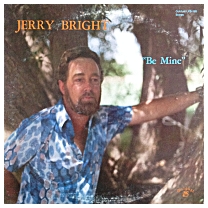 Jerry Bright "Be Mine" (Goldust Records, 1981) (LP)
Jerry Bright "Be Mine" (Goldust Records, 1981) (LP)
(Produced by Jerry Bright & Emmit Brooks)
Like a lot of early rockabilly artists, Las Cruces, New Mexico's Jerry Bright also recorded some more country-sounding material later in life... Bright is best known for his late '50s single, "Be Mine," which he originally recorded as a single, with his friend Bobby Fuller backing him up. A couple of decades later, he recorded this album, which includes a new version of his old song. It's basically a '50s-style oldies album, though there is a roadhouse/country twang undercurrent and some nice pedal steel on several songs, from local pickers Kenny Trantham and Calvin Turbeville. Nothing earth-shattering to be sure, but a nice example of the mellow roots music crossovers on the desert twang scene.
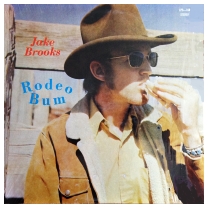 Jake Brooks "Rodeo Bum" (Goldust Records, 1974) (LP)
Jake Brooks "Rodeo Bum" (Goldust Records, 1974) (LP)
(Produced by Emmit Brooks)
You can file this easygoing, slightly rough-hewn set of real-deal rodeo songs right next to your Chris Ledoux albums... Indeed, over the years, Ledoux himself has covered several songs by New Mexico rodeo rider Jake Brooks, and this record features a bunch of rodeo-themed songs by the lean, lanky Mr. Brooks, as well as the topical "Little Brother," about a friend who went off to fight in Vietnam, and "Rodeo Cowboy's Wife," about the women who cheer on their hubbies while the guys pursue that eight second ride. If you like rodeo songs, you'll definitely want to check this album out.
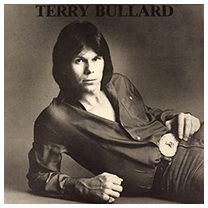 Terry Bullard "Terry Bullard" (Bullet Records, 1980) (LP)
Terry Bullard "Terry Bullard" (Bullet Records, 1980) (LP)
Originally from New Mexico, as a teenager Terry Bullard set out to conquer the world, moving first to LA and then to Texas, where he tried his hand at acting, country music and rodeo riding. Bullard had a regional hit with a version of Terry Stafford's "Amarillo By Morning" (a minor hit for Stafford in '73, and later a Top Five single for George Strait). He was taken under Stafford's wing for a while, and wrote a bunch of songs, but nothing ever quite clicked for him as a solo performer. This actually wasn't his first album -- he also recorded one called Pride when he was fifteen years old. Bullard apparently played in a few house bands in LA nightclubs and elsewhere, and has self-released a bunch of CDs in the digital era.
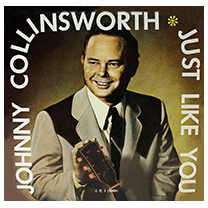 Johnny Collinsworth "Just Like You" (Barnel Records, 1984-?) (LP)
Johnny Collinsworth "Just Like You" (Barnel Records, 1984-?) (LP)
Born and raised in West Virginia, singer Johnny Collinsworth headed for New Mexico after getting out of the Air Force in the early 1950s, where he played with the Dick Bills band before starting his own group in Albuquerque. Eventually he moved up north -- to Alaska! -- where he was living when he cut this album. The band is small, just a trio with Collinsworth on vocals and guitar, his son Buddy playing bass and Gene Burrill on drums. There's a wealth of original material on here, including five songs written or co-written by Collinsworth, and three by his cousin, Frank Buckland.
Johnny Collinsworth "My Country" (Barnel Records, 19--?) (LP)
(Produced by Rob Olds & Dave Signs)
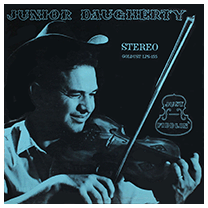 Junior Daugherty "Just Fiddlin' " (Goldust Records, 1971-?) (LP)
Junior Daugherty "Just Fiddlin' " (Goldust Records, 1971-?) (LP)
(Produced by Emmit Brooks)
New Mexico fiddler Forest Alton ("Junior") Daugherty was a prolific studio sideman and recording artist, often working with Emmit Brooks' independent Goldust label. At the time he cut this album, Daugherty had recently placed seventh in the National Old-Time Fiddling contest held in Weiser, Idaho, his first national competition. I think this was his first album, performed with backing from brothers Bob Jones (on drums) and Elbo Jones on guitar.
Junior Daugherty "Just Fiddlin', Volume II" (Goldust Records, 197--?) (LP)
(Produced by Emmit Brooks)
More zippy instrumentals, with the Jones brothers joined by Ruby Willis on bass.
Junior Daugherty "Just Waltzin', Volume II" (Goldust Records, 1973) (LP)
(Produced by Emmit Brooks)
At the time he cut this album, Daugherty had been nationally ranked in the several fiddling contests, and was striving to become #1. On this set he goes all-in on waltzes and Schottisches, with backing from Ruby Daugherty (Junior's sister) on bass, with Bob Jones playing drums and Elbo Jones on guitar.
Junior Daugherty "Fun Fiddlin' " (Goldust Records, 1974) (LP)
(Produced by Emmit Brooks)
Junior Daugherty & The Country Rebels "Junior Daugherty Presents The Country Rebels" (Goldust Records, 1973) (LP)
(Produced by Emmit Brooks)
Here, Mr. Daugherty fronts a full-on country band, with Jake Brooks on lead guitar, Daugherty's daughter Penny on vocals, Steve Hutchins (steel), Diane Miller (bass), Randy Miller (drums), Robin Miller (vocals), and Doug Niece on rhythm guitar and vocals. Other thanBrooks and the Daughertys, all the musicians were from Clovis, New Mexico, with 22-year old Doug Niece the oldest member, while the Millers were all teens. Jake Brooks was a professional rodeo rider who had also been in the band The Aggie Ramblers, along with Daugherty and his brother, Goldust label owner Emmit Brooks. Doug Niece was a Clovis local who worked as a firefighter and performed locally; later on in 1977 he had a new band called the runaways, although I think this was his only record. The album includes four original songs by Doug Niece, and three from Junior Daugherty.
Junior Daugherty "Fiddlin' Around" (Goldust Records, 1979) (LP)
Junior Daugherty & Bob Harmon "Mr. Fiddle, Mr. Banjo, And A Piano Named Sue" (Mesquite Records, 19--?) (LP)
(Produced by Emmitt Brooks)
This looks like an earlier album from fiddler-guitarist Junior Daugherty, sharing top billing with banjo plunker Bob Harmon, along with album producer Emmitt Brooks on bass, Jake Brooks (drums), Sue Hooser (piano), Travis Hooser (mandolin), and Vicki Hooser (twin piano), playing a selection of mostly older, traditional tunes (as well as a cover of the Beverley Hillbillies theme, "Ballad Of Jed Clampett.) No date on the album, but I'd guess it was from around 1972 or thereabouts.
 The Desperados "Desperado" (Rio Records, 1980)
The Desperados "Desperado" (Rio Records, 1980)
Hoo-boy. Desperado... Desperados... Desperadoes... Man, I bet there were an awful lot of bar bands who used that name. Anyway, I'll try and sort it all out... might take a while. This band, with Jim Tomlinson on pedal steel and Ted Scanlon singing lead vocals, was from Mesilla Park and Las Cruces, New Mexico, and had some jazzy stuff going on with their twang... The material was all cover tunes, so I figure they were a working band, though apparently none of the members was a songwriter. Founded in 1976, The Desperados became known as one of the most diehard western swing bands in the Southwest and have continued on for decades, helmed by Scanlon, but with a constantly evolving group of collaborators. One this first album, the lineup also included Carroll Gilley (piano), Bob Faris (fiddle), Pete Warner (drums) and Dale Baker (saxophone and flute.) The material is all cover songs, but they chose from the best, so you get a real chance to hear their chops.
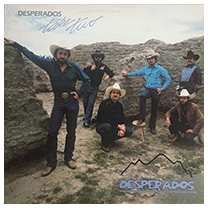 The Desperados "Take Two" (Rio Records, 1985) (LP)
The Desperados "Take Two" (Rio Records, 1985) (LP)
(Produced by Emitt Brooks & Steve Brooks)
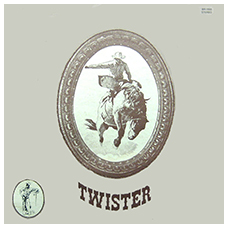 Steve Eastin "Twister" (Bronco Music Company, 1972) (LP)
Steve Eastin "Twister" (Bronco Music Company, 1972) (LP)
(Produced by Keith J. Seiler & Dick Hart)
A singer from New Mexico, Steve Eastin headed out to California to cut this album at Bell Studios in Hollywood -- he plays mandolin, banjo, guitar and dobro(!) with lead guitar by Larry Padilla and bassist Dana Jakubowski also playing several other instruments. Apparently Eastin was working as an actor in a B-movie called "Twister" when he got the chance to make this record... not much info available about the movie, either, or Eastin's short-lived acting career.
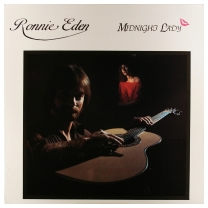 Ronnie Eden "Midnight Lady" (Kira Records, 1975) (LP)
Ronnie Eden "Midnight Lady" (Kira Records, 1975) (LP)
Another uber-indie offering from mid-'70s New Mexico, this has a pretty strong country feel to it, with pedal steel and fiddle firmly in the middle of the mix. As a songwriter and performer, Ronnie Eden was undeniably emphatic and sincere, but also fairly limited. None of the songs stood out as all that striking or well-defined, and the all-locals backing band has a similarly well-meaning but amateurish feel. (Pedal steel player Gary Null is a standout, but I'm a sucker for pedal steel... Also, I'm pretty sure he's not the same guy as the conservative radio personality Gary Nulle, but I wouldn't put any money on that bet...) Anyway, if you like indie-obscuro-private artist just based on authenticity alone, this is a nice, modest, purely local little record that you might find satisfying... Also, you sure can hear the Arizona accent here: Eden sounds a lot like his indiebilly contemporaries in Dusty Chaps and Chuck Wagon & The Wheels. I'm also a little curious about the Jim Green listed in the credits as having contributed several songs, although he was apparently not in the band... Anyone know more about him?
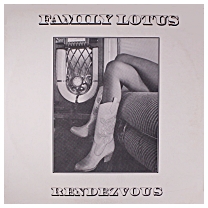 Family Lotus "Rendezvous" (Full Circle Records, 1979) (LP)
Family Lotus "Rendezvous" (Full Circle Records, 1979) (LP)
Founded in 1968, this puckish, eclectic, hippie-grass twangband was a mainstay of Santa Fe, New Mexico's 'Seventies music scene. The main drivers of the band were multi-instrumentalist songwriters Jim Bowie and Jerry Faires, who are pictured together on the back, although they had a huge supporting cast behind them, which ebbed and flowed in various permutations over the years, including a series of reunion gigs. Among the folks on this album is future folk-scene superstar Eliza Gilkyson, playing a minor role in the backup chorus. All the songs on here are originals, three of them written by Jerry Faires, and all the rest by Jim Bowie, including two co-written with pianist Dennis Culver.
The Fenders "Introducing The Fenders" (Indian Arts of America, 1964-?) (LP)
Not to be confused with any number of guitar rockers that named themselves after their Stratocasters, this was a Native American country band, first formed back in the late 1950s. Led by singer Ervin Becenti, the original Fenders were from Crownpoint, New Mexico, located in the Navajo Nation near Gallup, NM. They played together throughout the 1960s, recording at least four albums of classic honkytonk music, often given unique cultural tweaks that reflected their local tribal culture. According to ethnomusicologist Kristina Jacobsen, The Fenders was one of the earliest "chapterhouse bands," known for their rough-edged authenticity and unpolished "rez" sound, a style that was emulated by other regional bands for decades to come. As with many of these bands, the Fenders albums are exceedingly elusive -- I've only seen this one and the second pictured on the back cover of their third album, Fenders On Steel, as well as at least one later album from 1969, also listed here. The group was managed by a guy named Clyde Duncan, an African-American who worked at the Santa Fe Indian School, who put his address in Thoreau, NM on their albums and helped the band find gigs in the area. The group's legacy is rather complicated: years after the original Fenders disbanded, another group with no direct connection was formed, calling itself Fenders II; in turn that band split in half, with one set of musicians still calling themselves Fenders II and the other taking the name Fenders On Steel (named after the original band's third album). The original band's lineup included lead singer Ervin Becenti, Johnny Emerson, Jr., Edward Gruber, Jr., Rubin Mason and Tom Pete, though sadly I can't tell you who payed which instruments. They were heavy into classic hard country -- Webb Pierce, Jimmie Rodgers, Hank Williams, as well as younger artists such as Johnny Horton and the Bakersfield Sound of Buck Owens and his gang. As noted in Ms. Jacobsen's research, the Fenders and other chapterhouse bands often gave eccentric tweaks to classics country songs, substituting tribal words, changing melodic notes, singing in an "Indian accent," and the stylistic tics of the early bands of the 1950s and '60s became the foundation of their kind of country music, emulated by generations fo bands to come.
The Fenders "The Fenders -- Second Time Around" (1966-?) (LP)
With the same lineup intact, The Fenders dig deeper into the classic country canon, covering songs by Johnny Cash ("Folsom Prison Blues"), The Carter Family ("Wildwood Flower"), Webb Pierce ("I'm Walking The Dog"), Buck Owens ("Love's Gonna Live Here") and perhaps most importantly, the late Johnny Horton, whose "Honky Tonk Hardwood Floor" was a favorite at tribal "stomps," or live music shows. The World Cat website guesstimates a release date of 1966 on this one, which might be correct, although if they were inspired by Johnny Cash's At Folsom Prison album to cover that particular song, it would have been more like 1968 or after...
The Fenders "On Steel" (1968-?) (LP)
As implied by the album title, the group broadened its sound with the inclusion of steel player Bob Robertson, as well as a new drummer, Martin House. The rest of the lineup included Ervin Becenti, Johnny Emerson, Jr., Edward Gruber, Jr., Rubin Mason, and Tom Pete, with Becenti credited as the vocalist on Side One, and Mr. Emerson on Side Two. They dig even deeper into the West Coast/Bakersfield Sound, with songs by Merle Haggard, Buck Owens, Wynn Stewart and others, including a version of Charlie Walker's "Pick Me Up On Your Way Down" and another Johnny Horton oldie, "I Got A Hole In My Pirogue," adapted here into "I Got A Hold In My Pay Roll." The band's manager, Clyde Duncan, provides his home address in Thoreau, NM on the back cover, though the band itself lived on tribal lands nearby.
The Fenders "Once More Around" (1969) (LP)
The cover of this album was pictured inside the text of Kristina Jacobsen's highly informative essay, "Rita(hhh): Placemaking And Country Music On The Navajo Nation," with a release date of 1969. Haven't seen it listed elsewhere, and I'm not sure how many other albums the Fenders released, as their music seems to be generally off the radar in the outside world.
Billy Glenn & Texas Sand "Back To Hard Country" (Sidewinder Records, 19--?) (LP)
(Produced by Billy Glenn)
Great band name, Texas Sand. Dunno much about this fella from Edinburg, Texas... The liner notes tell us he's a latino whose family were migrants, and he seems to have moved to New Mexico by the time he started his musical career. I'm not 100% sure, but I think this is probably the same Billy Glenn who recorded several singles for Calvin Boles' New Mexican indie label, Yucca Records, probably some time in the 1960s. His band here included fifteen-year old Rodger Glenn on drums, bassist Mae Green, and steel player Larry McCurtry, with additional help from several Albuquerque locals, including Chuck Back on guitar, Red Herron (fiddle), Corliss Nelson (fiddle) and Vivian Hernandez on backing vocals. As fas as I know, this was his only album, and while it opens a bit wobbly, it grows on you. Glenn had an unusual voice, with a bit of Hank Locklin's thin, timorous tone, but the band is solid and the vibe is old-school, heartfelt hard country. Twangfans in search of soulful authenticity may wish to give this one whirl.
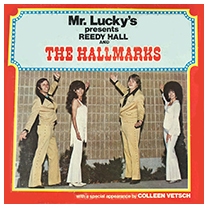 Reedy Hall & The Hallmarks "Mr. Lucky's Presents..." (Indian Store Records, 1976-?) (LP)
Reedy Hall & The Hallmarks "Mr. Lucky's Presents..." (Indian Store Records, 1976-?) (LP)
(Produced by Mike Shockley & Porter Wagoner)
Mid-Seventies Nashville-style pop and country standards, recorded in a session helmed by Porter Wagoner... The Hallmarks were a lounge band with a casino gig in Reno, Nevada and featured four solo vocalists -- Bobby Cook, Chari Ross, Colleen Vetsch, and keyboardist Reedy Hall (1934-2015) who led the band along with his wife Joanie Hall. Mr. Hall moved around a lot: he was born in Kentucky, lived in Montana and played gigs in Nevada through much of the 'Seventies. Despite being recorded in Nashville under Wagoner's watchful eye, the studio crew is remarkably free of "usual suspect" hotshot pickers; it looks like the band was mostly Hall's own group. Anyway, many of the tracks seems to be song demos with shared publishers, so that was probably their "in" with Porter... The only other mention of these folks I've been able to find are a couple of show notices from 1977, when they were playing Harvey's Lounge. The following year Reedy and Joanie Hall moved to Flora Vista, New Mexico, where they bought a venue called the Country Palace, which they operated for nearly thirty years before retiring in 2007. As far as I know, this was their only album.
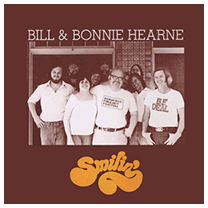 Bill Hearne & Bonnie Hearne "Smilin' " (B. F. Deal Records, 1977) (LP)
Bill Hearne & Bonnie Hearne "Smilin' " (B. F. Deal Records, 1977) (LP)
(Produced by Steve Brogden & Mike White)
Longtime stalwarts of the Kerrville Folk Festival, Bill and Bonnie Hearne were originally from Texas, and lean heavily on local Lone Star talents such as Dee Moeller and Shake Russell, as well as Michael Martin Murphey, recording no few than three of his songs on this album. The title track was written by Bonnie Hearne, but otherwise, these are other people's songs... Backing the Hearnes are folks such as guitarist Larry Nye, bassist Dave Magill and pedal steel player Charlie Holman, as well as album producer/label owner Mike Williams, who adds some harmonies on a tune or two. Later, around 1979, the Hearnes moved to New Mexico, with several other Texas indie types migrating with them...
Bill Hearne & Bonnie Hearne "New Mexico Rain" (Alpine Records, 1982-?) (LP)
(Produced by David Magill, Michael Hearne, Bill Hearne & Bonnie Hearne)
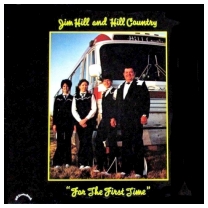 Jim Hill & Hill Country "For The First Time" (Hill Country Records, 1981) (LP)
Jim Hill & Hill Country "For The First Time" (Hill Country Records, 1981) (LP)
Indiebilly twang from New Mexico, with Curly Snow playing pedal steel, and Red Herron on fiddle...
Dick Jonas "FSH Volume 1" (Goldust Records, 1971)
Dick Jonas "FSH Volume 2" (Goldust Records, 1971)
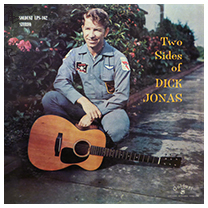 Dick Jonas "Two Sides Of Dick Jonas" (Goldust Records, 1973)
Dick Jonas "Two Sides Of Dick Jonas" (Goldust Records, 1973)
Country-folk singer-songwriter, Air Force veteran and political activist Dick Jonas was a surprise hitmaker for New Mexico's tiny indie label, Goldust Records, a financial rainmaker who bankrolled the rest of their obscure country and folk releases for years to come. Jonas was a highly decorated Vietnam-era fighter pilot who flew over 100 combat missions and recorded at least a half-dozen albums for Goldust, starting out with his biggest hits, FSH-1 and FSH-2, which included numerous songs about his combat experiences and about military aviation in general. I guess the records struck a chord with listeners who felt excluded from the national conversation as the war became increasingly unpopular and love of military prowess became seriously uncool. Jonas also became a spokesman for the POW-MIA movement, which was just gaining momentum as the war wound down and it became apparent that many American servicemen -- many of them downed fighter pilots -- hadn't come home and were still unaccounted for. On this album he adds his working-class bona fides into the mix, with songs about plumbing and farming. It's an odd and very particular slice of folkie-Americana, but certainly authentic, and worth knowing about, especially for military history and political buffs.
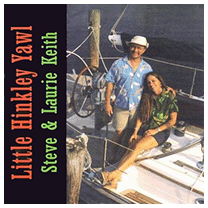 Steve Keith & Laurie Keith "Little Hinkley Yawl" (Don Quixote Records, 1998)
Steve Keith & Laurie Keith "Little Hinkley Yawl" (Don Quixote Records, 1998)
A self-released set from picker Steve Keith, who led Albuquerque's regionally successful hippiebilly band The Last Mile Ramblers before embarking on a career as a sideman for rootsy artists such as David Bromberg, Jimmy Martin, Mason Williams and Steve Young. I haven't heard his solo stuff, but I figured this was a good place to include it, even though this wasn't actually recorded in the '70s. It's a slippery slope, keeping track of all these folks!
 Steve Keith "Fresh Fish" (Don Quixote, 2004)
Steve Keith "Fresh Fish" (Don Quixote, 2004)
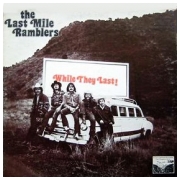 The Last Mile Ramblers "While They Last!" (Blue Canyon Records, 1974) (LP)
The Last Mile Ramblers "While They Last!" (Blue Canyon Records, 1974) (LP)
Based in Albuquerque, NM, the Last Mile Ramblers were stalwarts of the Southwestern roots-revival scene; founded in 1970, they recorded two albums in the '70s and stayed together in various formations over the next three decades. Like a lot of these regional roadhouse bands, the Ramblers were both local legends and a waystation for talented musicians: the band's founder Steve Keith eventually got a gig with "Classical Gas" guitarist Mason Williams, and went on to work with a number of country and roots artists... At one point alt-country guitar star Junior Brown was in the band (and is said to be on this album...) This was their first album, and one of the earliest self-released records in the 1970s hippie/desert country scene.
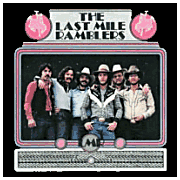 The Last Mile Ramblers "LMR" (Windswept Records, 1979) (LP)
The Last Mile Ramblers "LMR" (Windswept Records, 1979) (LP)
(Produced by Baird Banner & George Bullfrog)
A nice, simple swing/western-swing revival set, with a bit of straight country twang and blues as well. Lead singer George Bourque was probably teasing himself with his stage name of "George Bullfrog," but despite his modest vocal talents, he projects calm self-assurance and an affection for the material that give this album a pleasant warmth. Some nice steel playing as well, by a guy named Jon Potrykus... Also notable is the credit for "Lisa Gilkyson" listed as singing harmony vocals on a couple of tracks... Doubtless this was future Americana-folkie star Eliza Gilkyson, who was a desert denizen at the time. (Anyone know for sure?) Anyway, this is a nice, unassuming album, maybe with more dents and wrinkles than modern-day listeners are used to hearing, but a fine example of disco-era indie-country DIY.
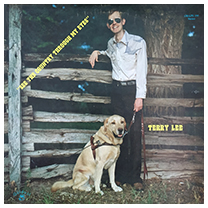 Terry Lee "See The Country Through My Eyes" (Goldust Records, 1983) (LP)
Terry Lee "See The Country Through My Eyes" (Goldust Records, 1983) (LP)
An uber-indie set by Terry Lee Denson, who worked at a steakhouse in Lovington, New Mexico called the Hi-Lonesome Depot, a well-known Southwestern country music venue that hosted local and regional artists as well as national acts such as George Strait and Moe Bandy. The Depot burned down on New Years Day, 1984, so this album from '83 is probably one of its last souvenirs... Terry Lee was apparently blind and is pictured on the cover with one of those super-sweet seeing-eye dogs, so I'd guess the album title is a pun relating to his disability. Backing Mr. Denson on this disc is a band from El Paso, Texas, Joey Carmon & Crossbow, who also recorded a couple of albums around this time... presumably they played at the Depot a time or two before it burned down. The liner notes inform us that this was Terry Lee's first album, so he doesn't seem to be the same person who recorded for Crown in the 1960s.
Bill Lendrum "Try A Little Kindness" (Crown Records, 1969) (LP)
Assuming it's all the same guy, Bill Lendrum seems to have moved around a lot during his career... Known as "Pineapple Bill" Lendrum, he lived in Hawaii and sang hapa haole-style island-themed novelty songs, as well as country stuff. I'm not sure where he was living when he cut this album, but in the early '70s he was considered a "local legend" in Las Cruces, New Mexico, where he recorded for the Goldust label, and had some of his music recorded by other local artists. In 1975 he recorded a second album for the Oklahoma City-based Homa label and later, in the late 1980s, Lendrum was living in Griffin, Indiana but still playing music, and even won a national talent contest sponsored by the True Value hardware company. This album seems to have been packed with original material.
Bill Lendrum "The Hapahaule Cowboy" (Homa Records, 1976) (LP)
(Produced by Mickey Sherman & David Powell)
I think Mr. Lendrum was living in Griffin, Indiana when he cut this album, although it was released on the Oklahoma City-based Homa label, with fiddler Benny Kubiak chiming in... The hapa haole reference hearkens back to his days on the Islands, as does the mixed country/Hawaiian repertoire... The album includes eight songs by Lendrum, along with covers of "Rhinestone Cowboy" and "Tiny Bubbles."
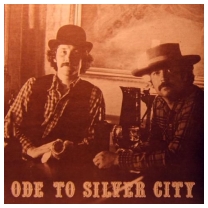 George Lewis "Ode To Silver City" (LSI Sound Studios, 19--?) (LP)
George Lewis "Ode To Silver City" (LSI Sound Studios, 19--?) (LP)
A folkie concept album, sung in praise of Silver City, New Mexico... With backing by the so-called Silver City Symphony and the Silver City Saloon Singers. I think the "saloon" part of that phrase is the key.
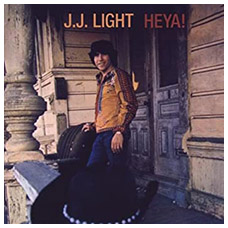 J. J. Light "Heya!" (Liberty Records, 1969) (LP)
J. J. Light "Heya!" (Liberty Records, 1969) (LP)
(Produced by Bob Markley)
Kooky, excessive, spacey hippie rock with discernible country influences... Originally from New Mexico, J. J. Light (nee Jim Stallings) headed west in the late 1950s out to LA to try and make it in the music business... He struggled for years, as many do, and released a couple of singles before landing in the orbit of trust-fund baby Bob Markley, who had led the notoriously faux-psychedelic exploito-ensemble known as The West Coast Pop Art Experimental Band. Markley produced this album with much the same cavalier, slapdash approach as heard on the WCPAEB albums, slathering various tracks with fuzzed-out hippie-rock lead guitar riffs and goofy, marginally coherent lyrics, anchored by a slamming downbeat courtesy of drummers Jim Gordon and Earl Palmer. The sessions also featured Larry Knechtel on organ and keyboards, as well as bassist Joe Osborn and electric guitarist Gary Rowles, an A-list studio crew from the SoCal scene of '69... Mostly, I'd have to say this is probably mostly of interest to rock fans, though there are rootsy touches woven throughout the record. Stallings/Light actually had an international hit the title track of this album (which was especially big in Brazil, for some reason...) and while some may bristle at the seemingly phony Native American sound of the chorus chant, Stallings actually was Native American himself, a member of the Navajo nation. So, there's some wiggle room there. Anyway, country-rock fans may also recognize Stallings for his on-again/off-again contributions to the Sir Douglas Quintet albums of the same era, where he was one of the band's in-studio bass players. Although "Heya" was a hit single, apparently Stallings got kind of freaked out by it, and while he continued to record under his J.J. Light pseudonym, he mostly faded from the spotlight.
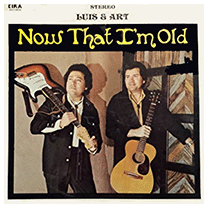 Luis & Art "Now That I'm Old" (Kira Records, 19--?) (LP)
Luis & Art "Now That I'm Old" (Kira Records, 19--?) (LP)
Two kids from Clayton, New Mexico, Art Grine and Luis Grine were southwestern teen rockers when they cut their first single way back in 1962 at the fabled Norman Petty Studios, while playing local gigs as The Rockin' Crickets, and later as The Eternals, or so the liner notes tell us. They eventually moved to the big city, making a go of it in Albuquerque in '67, playing "their rhythmic sounds which range from the lonely western ballad to the spicy Latin beat or the locally popular rancheras." On this album Los Hermanos Grine multi-tracked their performances, so Art Grine plays lead guitar and drums, while Luis plays bass and rhythm guitar. They get some additional assists by Larry Montoya (harmony vocals) and E. Cordova (in an unspecified capacity). About as home-grown as you can get!
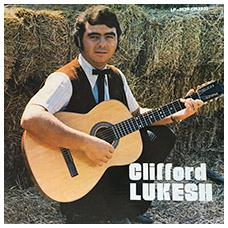 Clifford Lopez Lukesh "Clifford Lopez Lukesh" (LP)
Clifford Lopez Lukesh "Clifford Lopez Lukesh" (LP)
A bilingual country album from an influential New Mexico singer, with Spanish-language songs alongside English-language honkytonk standards... I wasn't able to track down a label name or recording/release date for this one (or any of his other albums, and there are a few) but I'd welcome any info that readers can provide...
 The Clay Mac Band "Everybody's Favorite Cowboy" (ASA, 1977-?) (LP)
The Clay Mac Band "Everybody's Favorite Cowboy" (ASA, 1977-?) (LP)
(Produced by John L. Alsip & Terry Nelson)
A great record with one of the all-time unfortunate album covers... This zippy, unpretentious little gem of indie twang reminds me quite a bit of outlaw-era favorites such as Alvin Crow or Deadly Ernest, a niche record, confidently performed by a rock-solid local band. New Mexico fiddler and guitar picker Clay McWhorter led his western swing-flavored group, The Clay Mac Band, for several decades, putting the first version together around 1970... In the late 'Seventies they had a regional hit with a song called "Boilermaker," which is included on this album. It's one of three tunes credited to McWhorter, along with the title track and one called "Later In Time." Other originals include two apiece from songwriters Judith Bordan and Bobby Fischer, who don't perform on this record, but must have been friends of the band. A trio of intriguing cover tunes close out Side One of the album, from Eric Clapton's "Lay Down Sally" and "I Don't Want To Spoil The Party" by the Beatles to a cover of "Cuckoo Bird" by bluegrass music's Osborne Brothers. The musicians on here included Clay Mac on fiddle, along with Mike Easterling (banjo), John Kurnick (piano and guitar), Colin Kyffin (dobro and steel guitar) and perhaps most notably Phil Salazar on mandolin; he later went on to lead his own bluegrass group and receded several records of his own. Several gals sang backup or harmonies on various tunes, including Dana Bivens who sang on "Boilermaker" and later became one of the band's featured singers.
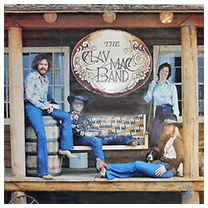 The Clay Mac Band "The Clay Mac Band" (Goldust Records, 1980) (LP)
The Clay Mac Band "The Clay Mac Band" (Goldust Records, 1980) (LP)
(Produced by Emmit Brooks)
Different lineup here, with the band now centered around Clay Mac, on and Dana Bivens and BoBo Supak, At some point, Mr. Mac and Ms. Bevins appear to have gotten married, and for a while she was plugged as a soloist -- in 1982 they released as single under the name Dana And The Clay Mac Band, and at some point she started performing as Dana Mac. Clay Mac kept his band running for decades, and around 2008 he moved from Ruidoso, NM over to Van Horn, Texas, where he set up shop as a tax consultant, though he continued to do shows in New Mexico and environs.
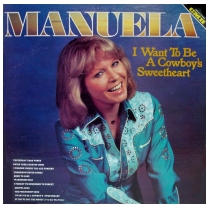 Manuela "I Want To Be A Cowboy's Sweetheart" (CMH Records, 1977) (LP)
Manuela "I Want To Be A Cowboy's Sweetheart" (CMH Records, 1977) (LP)
(Produced by Martin Haerle, John Wagner & Jack Linnemann)
I'm not sure what her last name was, but despite being a young'un, Manuela was certainly devoted to traditional, old-school country sounds of bygone years... To start with, there's her version of the title track, a cowgal classic by Patsy Montana, along with other oldies such as "Born To Lose," "If You've Got The Money (I've Got The Time)" and "I Forgot To Remember To Forget." This album was partly recorded in Nashville, and partly at John Wagner's studio in Albuquerque, but it certainly shows a devotion to a style of twang that came decades earlier... Not all western stuff, by any means, but a nice echo of the country styles of the 1930s, '40s and '50s.
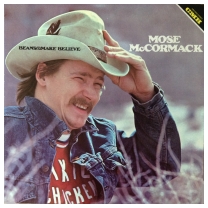 Mose McCormack "Beans And Make Believe" (CMH Records, 1976) (LP)
Mose McCormack "Beans And Make Believe" (CMH Records, 1976) (LP)
(Produced by John Wagner)
I've tried a few times to get into this album, but just couldn't. Not a lot of info about this guy online... Apparently R. D. "Mose" McCormack was born in Alabama, but long ago made New Mexico his home, and is considered by many to be one of the state's best indie twangsters. But though this record looks like it should be super-cool, it feels nakedly imitative of Jerry Jeff Walker's laid-back cosmic-cowboy vibe, yet lacks the humor and charm of Walker's work. It feels forced and flat, though maybe that's just me -- I can be a little crabby sometimes. Anyway, worth noting here is the presence of producer John Wagner, another New Mexico local who has worked with McCormack continuously for several decades, producing his albums while having Mose play on his...
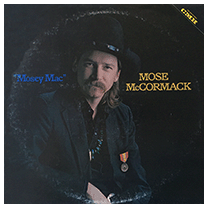 Mose McCormack "Mosey Mac" (CMH Records, 1981)
Mose McCormack "Mosey Mac" (CMH Records, 1981)
(Produced by John Wagner)
 Mose McCormack "After All These Years" (JWRS Records, 2009)
Mose McCormack "After All These Years" (JWRS Records, 2009)
 The Moon Pie Daince Band "Enchanted Mesa" (Goldust Records, 1978) (LP)
The Moon Pie Daince Band "Enchanted Mesa" (Goldust Records, 1978) (LP)
A rootsy-hippie jam band from El Paso, Texas with a distinctly Grateful Dead-ish vibe, crossed with Allman Brothers-esque Southern Rock guitars... Funny stuff, though very much of its time!
The Moon Pie Daince Band "Flower In The Sand" (Folklore Records, 1982)
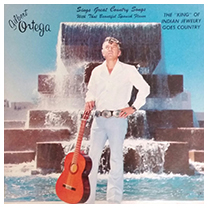 Gilbert Ortega "The King Of Indian Jewelry Goes Country" (Ortega Records, 1977) (LP)
Gilbert Ortega "The King Of Indian Jewelry Goes Country" (Ortega Records, 1977) (LP)
(Produced by Little Richie Johnson)
Holbrook, New Mexico's well-known Native American businessman Gilbert Ortega -- best known for cornering the market on turquoise jewelry -- sings a set of country standards, mostly honkytonkers and weepers like "Crying Time," "Cold, Cold Heart," "Nobody's Darlin' But Mine" and "Together Again." Local producer Richie Johnson booked time with an A-list usual-suspects studio crew: Johnny Gimble, Lloyd Green, Dave Kirby, Charlie McCoy, Hargus Robbins, et. al. I guess he really gave a career as a country singer a shot for a while, but his bread and butter was, of course, his multi-million dollar jewelry empire... Still, as vanity records go, this one's a doozy.
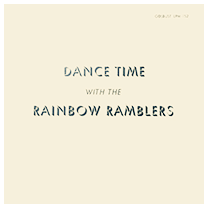 The Rainbow Ramblers "Dance Time With The Rainbow Ramblers" (Goldust Records, 196-?) (LP)
The Rainbow Ramblers "Dance Time With The Rainbow Ramblers" (Goldust Records, 196-?) (LP)
(Produced by Emmit Brooks)
Led by singer Bill Marinell, the Rainbow Ramblers were a straight-up country dance band from Ruidoso, New Mexico, with a following throughout the Southwest. The group was formed in 1962 and included Hank Henke playing bass, Jimmy Patterson (drums), Jimmy Temple (lead guitar), Calvin Turbeville (steel guitar), and Fred Wood on fiddle. The set list for this album is almost all cover songs, stuff by George Morgan, Moon Mullican, Buck Owens and Bob Wills, as well as one song penned by Bill Martinell, "Like I Did You." Martinell sings lead on most tracks, with Temple and Wood each taking the spotlight on one song. Other than a single or two, I'm not sure if they made other records; Calvin Turbeville worked as a session player on several other Goldust albums.
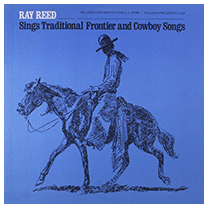 Ray Reed "Sings Traditional Frontier And Cowboy Songs" (Folkways Records, 1977) (CD)
Ray Reed "Sings Traditional Frontier And Cowboy Songs" (Folkways Records, 1977) (CD)
(Produced by J. D. Robb)
Western singer and cultural preservationist Raymone William Reed (1917-1998) came from a ranching family near Clovis, New Mexico and grew up as an actual, working cowboy. In his youth spent time out in California and hung out with West Coast country musicians, including some guys from the Bob Wills band. Eventually he moved back home, but it was during a trip to Texas in 1989 that he attended a western event in Lubbock that inspired him to create a similar gathering in New Mexico. Reed was the driving force behind the Lincoln County Cowboy Symposium, and annual shindig filled with poetry and song -- this album shows Reed's own facility with ballads and tall tales, a nice addition to the cowboy canon.
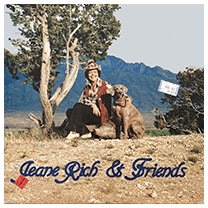 Jeane Rich "Jeane Rich And Friends" (Black Gold Records, 1983) (LP)
Jeane Rich "Jeane Rich And Friends" (Black Gold Records, 1983) (LP)
(Produced by Jeane Rich, Sid Fendley & Gordon R. DeVore)
An ambitious, or perhaps aspirational, set of country and jazz-ish pop vocals, with several Patsy Cline covers and other swank, torchy tunes such as "I'll Be Your Baby Tonight" and "Mack The Knife," as well as a few country and western swing oldies like "Pick Me Up On Your Way Down" and "San Antonio Rose." This highly informal jam session from Albuquerque, New Mexico featured singer Jeane Rich, backed by a mostly-amateur band, featuring co-producer Sid Fendley on keyboards, Joe Maese Jr. (drums), Don Sawyer (guitar), Scott Tregembo (bass), and Norma Scarberry playing fiddle. Sadly, it's a pretty flawed album, mostly because Ms. Rich was an inconsistent vocalist -- she hits some nice notes and has a few fine passages, but she gets a bit wobbly as well, and her jazz inclinations frequently pull the country stuff off-center. That being said, the gal's a plugger: there are show dates listed online dating back to the early 'Seventies, as well as when this album came out -- right up until the 2020s, when she was still performing in the region, these days with a band called Mixed Company, playing a mix of pop and country oldies.
Rio Grande Gold "# 1" (Turquoise Trail Records, 1979) (LP)
(Produced by Rio Grande Gold)
This band from Cerritos, New Mexico included local legend Lewie Wickham who'd led a trio, a duo and a solo career before going all-out country with these guys. This was a pretty ambitious album, spanning honky-tonk, country-pop, folk/countrypolitan ballads and a little bit of outlaw twang... Wickham was just one of several lead singers, notably latina singer Kay Kay Baca, whose chirpy voice had hints of Dolly Parton as well Dolly's sister, Crystal Gayle, who she seems to have been channeling on the perky pop of "Before My Heart Falls Prey." She sings several solo numbers, as well as a few duets with Wickham and the other male lead singer. With a wide stylistic scope and a very professional attitude, these guys had a strong almost-but-not-quite feel -- you can taste the hit potential, but the magic's not quite there in the recordings. Still, this is a good record from a very focussed, ambitious regional band, a better-than-average record from a group that clearly hoped to break through into the big time. A little softer than I usually like my twang, but definitely worth a spin.
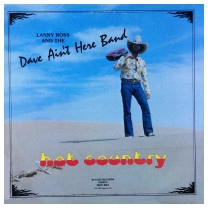 Lanny Ross & The Dave Ain't Here Band "Hot Country" (Nugget Records, 1980) (LP)
Lanny Ross & The Dave Ain't Here Band "Hot Country" (Nugget Records, 1980) (LP)
(Produced by Lanny Ross)
A nice set of indie twang from the New Mexico scene... This is mostly all original material written by L. R. Gerald (presumably Lanny Ross?) with lively, enthusiastic backing by a local Albuquerque band with plenty of pep... Fiddles, pedal steel, harmonica and twangy guitar back Ross' plainspun vocals. Plenty of good tunes, as well, including winners such as "Sweet Steel Guitar," "Hardhat Days, Honky Tonk Nights, Hillbilly Bands" and the cleverly-titled "Skoal Brother." Definitely worth tracking this one down.
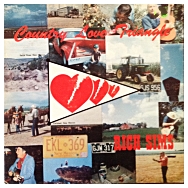 Rich Sims "Country Love Triangle" (QCA Recording Studios, 1981) (LP)
Rich Sims "Country Love Triangle" (QCA Recording Studios, 1981) (LP)
(Produced by Denny "Dumpy" Rice)
Ouch. Now, I'm not one to use these reviews of "private" records as an opportunity to mock these little-known artists, though sometimes you have to call 'em like you see 'em... As the too-revealing liner notes explain, middle-aged songwriter Rich Sims was kind of a jack-of-all-trades, a one-time rodeo rider who eventually became "a successful business executive with a large insurance company," Sims was born in New Mexico and moved around a lot, but was living in the Midwest (Boyden, Iowa, to be precise) when he recorded this album... One thing he wasn't naturally born to, though, was music. Despite his very apparent enthusiasm, Sims sings out of tune, writes lyrics that stray out of the meter, and has trouble phrasing inside the tempo when he sings... Although his heart is in every performance, this still winds up falling in the so-bad-it's-good category, sort of a honkytonk Mrs. Miller kind of affair. The backing band is decent, though a bit thumpy and by-the-numbers. Still, there are some tracks that hold up and might be fun in a mix, notably the she-took-everything-in-the-divorce novelty number, " '65 Ford Pickup Truck" and "I'm Better At It Now," Mr. Sims's song extolling the virtues of middle age. I also like how the liners mention that he was in a Fort Worth-based group called "Cowboys For Christ..." I bet their meetings were fun!
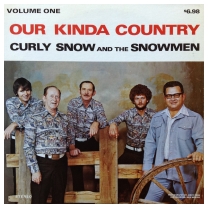 Curly Snow & The Snowmen "Our Kinda Country" (High Country Records) (LP)
Curly Snow & The Snowmen "Our Kinda Country" (High Country Records) (LP)
(Produced by Bill Hunter)
Southwestern pedal steel player Curly Snow led his band, the Snowmen for several decades, at least as far back as the late 1960s, when he was playing gigs in Albuquerque, New Mexico, and had a long stint as the house band for the Sandia Inn in the mid-'70s. I'm not sure but I think this album -- which looks to be of early '80s or late '70s vintage -- might have been his only record. Anyway, it's a nice set, ranging from Ray Price-style countrypolitan to more vigorous honkytonk, with Snow swapping licks with fiddler Red Herron, while his son, Mike Snow keeps the tempo going on drums. It's all cover tunes, but sweetly played and with great confidence.
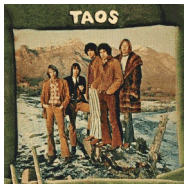 Taos "Taos" (Mercury Records, 1970) (LP)
Taos "Taos" (Mercury Records, 1970) (LP)
Heavily influenced by Crosby Stills & Nash, The Byrds and various boogie-rockers and sunshine pop bands of the era, these guys from New Mexico were more of a rock-harmony band, though they experimented earnestly with twangy shadings in their music -- haphazard steel guitar, mandolin riffs and some out-of-tune guitar strumming (as a mistakenly "country" sound, as on "On The Way Down"). The group included Jeff Baker (rhythm guitar), Kit Bedford (bass), Albie Ciappa (drums), Burt Levine (banjo, lead guitar and steel), Steve Oppenheim (guitar and piano), with each of the guys chiming in on vocals. The bandmembers were from all over, East Coast and West Coast, but they were hanging in Taos when they cut this disc... as far as I know this was the group's only record, and I'm not sure if any of them worked on other projects later on. Anyway, maybe this isn't the bestest hippie rock album ever, but it is an authentic memento of its times, and folks who are into CS&N or Buffalo Springfield will probably get a kick out of this as well. Plus, it's another piece of the desert-twang jigsaw... they sure had a lot of hippiebilly bands out there in the Southwest, didn't they?
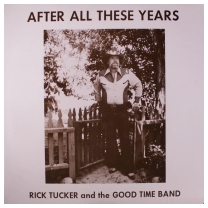 Rick Tucker & The Good Time Band "After All These Years" (Sound Of Clovis, 19--?) (LP)
Rick Tucker & The Good Time Band "After All These Years" (Sound Of Clovis, 19--?) (LP)
Apparently Rick Tucker was once upon a time a guitar player for rock'n'roll forefather Buddy Holly, and here he covers "Everyday" at the end of an album that is otherwise dominated by his own material -- eight out of ten songs were Tucker originals. Norman Petty plays celeste on one song, and it seems likely he also produced the album... The big wow for me, though is the credit for Pete Anderson on lead guitar -- yup, that's right: the same Pete Anderson who helped craft Dwight Yoakam's neotrad twang sound! Also in the band was drummer Pete Gavin, who was in Albert Lee's old group, Head, Hands & Feet, so you know these guys were the real deal.
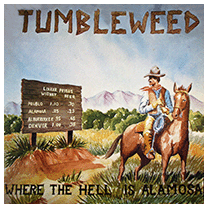 Tumbleweed "Where In The Hell Is Alamosa?" (Dogwood Records, 1978) (LP)
Tumbleweed "Where In The Hell Is Alamosa?" (Dogwood Records, 1978) (LP)
(Produced by S. Hendricks & Ronald Vallery)
Well, it's a fair question: itty-bitty, lil' old Alamosa is 'way down in the Southern end of Colorado, North of Santa Fe, New Mexico and sorta-kinda near to Pueblo. I'm not sure if this band actually lived there, but wherever they were from, they managed to record a fine set of outlaw country on an album packed with original material. I think there are only three cover songs on here - tunes by Gene Clark, David Allan Coe and Jim Dawson, to give you a sense of where these guys were coming from. Other than that, though, these are all originals by the boys in the band.
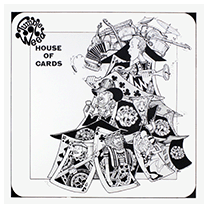 Tumbleweed "House Of Cards" (Howlin' Dog, 1985) (LP)
Tumbleweed "House Of Cards" (Howlin' Dog, 1985) (LP)
(Produced by Baird Banner)
This edition of the band included Robert ("Robear") Bosdorf (lead guitar and pedal steel), George Egbert (drums), Charlie Johnson (bass), multi-instrumentalist Don Richmond (banjo, guitar, fiddle, and pedal steel), and Scott Russell on guitar and mandolin. Once again, an album packed with original material, mostly written by either Bosdorf or Richmond, with Scott Russell contributing a tune called "Sailing Away." This session was recorded in Cerrillos, NM.
Tumbleweed "Welcome" (Tumbleweed, 1987) (LP)
(Produced by Baird Banner & Jeff Nelson)
 T. Z. Wright "T. Z. Wright" (1977) (LP)
T. Z. Wright "T. Z. Wright" (1977) (LP)
(Produced by Fred Veanaglia & Larry White)
Singer-songwriter T. Z. Wright originally hails from Oklahoma, but was living in New Mexico when he cut this album, leading the house band at a place called the Motherlode, in Red River... This album features a bunch of original material, and some swell pedal steel guitar throughout. Wright plays bass, guitar and piano, with backing by David Coe (fiddle and mandolin), Rick Fowley (guitar), and drummer Rick Klein, along with additional musicians that seem to have been used on one track recorded in Dallas. Nice stuff... he even kinda reminds me of Dick Feller, which in my book is a real compliment.
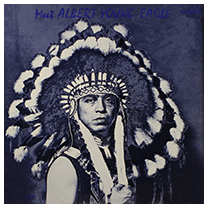 Albert Young Eagle "Meet Albert Young Eagle" (Little Richie Records, 1977-?) (LP)
Albert Young Eagle "Meet Albert Young Eagle" (Little Richie Records, 1977-?) (LP)
Surprisingly little information about this fellow online, though the back cover liner notes provide a pretty concise outline of his biography. According to this album Albert Young Eagle was apparently of Navajo descent, born in Gallup, New Mexico in 1953 and mostly raised on a nearby reservation located next to the El Morro National Monument. His father owned a nightclub called the Rendezvous Bar, and as a teenager Albert was in a rock band called the Teardrops for several years before he joined the military. He switched to country music after he came back home to Gallup, and was in the orbit of Southwestern music mogul Little Richie Johnson for most of his career, traveling to Nashville to record with Charlie McCoy and his A-list crew, most likely on Little Richie's dime. One missing piece of the puzzle is whether he was actually Albert Lucero, the name given on the composer of one of his songs, "It's All Over Now," which was released as a single and also appears on this album. The Bakers Patch music blog says yes, though the copyright filing with the Library Of Congress listed Lucero and Young Eagle separately. However, the composer credit on this album gives Albert Young Eagle as the author, which gets me to about 99% certainty that his birth name was Lucero, particularly since the trail grows cold on the Young Eagle name, outside of the handful of records produced in the late '70s. The rest of his biography remains obscure: Albert Young Eagle was elected into the Colorado Country Music Hall Of Fame in 1979, so it's possible he moved to the Centennial State sometime after this album came out. There obituaries for several Albert Luceros who lived in several different states -- Arizona, Colorado, etc. -- but I was unable to link any of them to this artist. Unless I hear otherwise, though, I'll accept Mr. Lucero's assertion that he was a First Nations country singer and add him to the list.
 Albert Young Eagle "The Best Of Albert Young Eagle" (Little Richie Records, 1979-?) (LP)
Albert Young Eagle "The Best Of Albert Young Eagle" (Little Richie Records, 1979-?) (LP)
An odd album title, particularly as none of the tracks on Young Eagle's first album are included... Partly drawing on some late-'Seventies singles, this is mostly a set of cover tunes, mainly brand-name country classics such as "Faded Love," "Green Green Grass Of Home," "Statue Of A Fool" and "Help Me Make It Through The Night," et.al., though there are also three songs provided by Little Richie Johnson's publishing company: "Have A Talk With Your Conscience," "On My Way To Houston," and "Unwritten, Unsung Country Love Song," though all three were also recorded by other Little Richie artists.
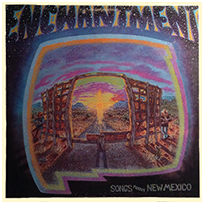 Various Artists "ENCHANTMENT: SONGS ABOUT NEW MEXICO" (KRST, 1976) (LP)
Various Artists "ENCHANTMENT: SONGS ABOUT NEW MEXICO" (KRST, 1976) (LP)
(Various producers)
A statewide collection from the land of enchantment, the first of several regional-talent albums sponsored by Albuquerque radio station KRST, 92.3 FM. Although rock'n'roll and funk artists are well represented, this has a heavy tilt towards twang, including tracks by The Last Mile Ramblers, Watermelon Mountain Jug Band, and a track credited to C.J. & Friends, which seems to be a spinoff of the Family Lotus, a bluegrass'n'twang band that also featured backing vocals from Eliza (Lisa) Gilkyson, who lived in Santa Fe during the 1970s.
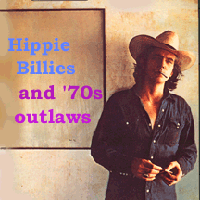 Locals Only: New Mexico Twang This page collects artist profiles and record reviews of country music from the state of New Mexico. It's part of a larger guide to unsigned and off-the-radar regional artists from years gone by, which is also part of the even larger Guide To Hick Music on Slipcue.com. Most of the artists here are little-known locals, bar-band singers, etc., but the list also includes Nashville stars who were from the state, as well as some bluegrass and gospel artists, etc. This is an ongoing projects, with new stuff coming in all the time, and we welcome any recommendations, additions or corrections.
Locals Only: New Mexico Twang This page collects artist profiles and record reviews of country music from the state of New Mexico. It's part of a larger guide to unsigned and off-the-radar regional artists from years gone by, which is also part of the even larger Guide To Hick Music on Slipcue.com. Most of the artists here are little-known locals, bar-band singers, etc., but the list also includes Nashville stars who were from the state, as well as some bluegrass and gospel artists, etc. This is an ongoing projects, with new stuff coming in all the time, and we welcome any recommendations, additions or corrections.
 The Aggie Ramblers "After Sundown With The Aggie Ramblers" (Goldust Records, 19--?) (LP)
The Aggie Ramblers "After Sundown With The Aggie Ramblers" (Goldust Records, 19--?) (LP)
 The Aggie Ramblers "Ramblin' With The Aggie Ramblers" (Goldust Records, 19--?) (LP)
The Aggie Ramblers "Ramblin' With The Aggie Ramblers" (Goldust Records, 19--?) (LP)
 Bucky Allred "Bucky Allred" (Chaparral Records, 1977) (LP)
Bucky Allred "Bucky Allred" (Chaparral Records, 1977) (LP)
 Badlands "Badlands" (CMH Records, 1981) (LP)
Badlands "Badlands" (CMH Records, 1981) (LP)
 Calvin Boles "Favorites And Originals" (Yucca Records, 1960-?) (LP)
Calvin Boles "Favorites And Originals" (Yucca Records, 1960-?) (LP)
 Calvin Boles "This Is Calvin Boles" (Yucca Records) (LP)
Calvin Boles "This Is Calvin Boles" (Yucca Records) (LP)
 Calvin Boles "New Mexico: Ballads Of The Southwest" (Yucca Records, 1963-?) (LP)
Calvin Boles "New Mexico: Ballads Of The Southwest" (Yucca Records, 1963-?) (LP)
 Calvin Boles "Walkin' Beside You" (Yucca Records, 19--?) (LP)
Calvin Boles "Walkin' Beside You" (Yucca Records, 19--?) (LP)
 Gene Booth "The Singing Mortician" (Gene Booth Records, 19--?) (LP)
Gene Booth "The Singing Mortician" (Gene Booth Records, 19--?) (LP)
 Jerry Bright "Be Mine" (Goldust Records, 1981) (LP)
Jerry Bright "Be Mine" (Goldust Records, 1981) (LP)
 Jake Brooks "Rodeo Bum" (Goldust Records, 1974) (LP)
Jake Brooks "Rodeo Bum" (Goldust Records, 1974) (LP)
 Terry Bullard "Terry Bullard" (Bullet Records, 1980) (LP)
Terry Bullard "Terry Bullard" (Bullet Records, 1980) (LP)
 Johnny Collinsworth "Just Like You" (Barnel Records, 1984-?) (LP)
Johnny Collinsworth "Just Like You" (Barnel Records, 1984-?) (LP)
 Junior Daugherty "Just Fiddlin' " (Goldust Records, 1971-?) (LP)
Junior Daugherty "Just Fiddlin' " (Goldust Records, 1971-?) (LP)
 The Desperados "Take Two" (Rio Records, 1985) (LP)
The Desperados "Take Two" (Rio Records, 1985) (LP)
 Steve Eastin "Twister" (Bronco Music Company, 1972) (LP)
Steve Eastin "Twister" (Bronco Music Company, 1972) (LP)
 Ronnie Eden "Midnight Lady" (Kira Records, 1975) (LP)
Ronnie Eden "Midnight Lady" (Kira Records, 1975) (LP)
 Family Lotus "Rendezvous" (Full Circle Records, 1979) (LP)
Family Lotus "Rendezvous" (Full Circle Records, 1979) (LP)
 Reedy Hall & The Hallmarks "Mr. Lucky's Presents..." (Indian Store Records, 1976-?) (LP)
Reedy Hall & The Hallmarks "Mr. Lucky's Presents..." (Indian Store Records, 1976-?) (LP)
 Bill Hearne & Bonnie Hearne "Smilin' " (B. F. Deal Records, 1977) (LP)
Bill Hearne & Bonnie Hearne "Smilin' " (B. F. Deal Records, 1977) (LP)
 Jim Hill & Hill Country "For The First Time" (Hill Country Records, 1981) (LP)
Jim Hill & Hill Country "For The First Time" (Hill Country Records, 1981) (LP)
 Dick Jonas "Two Sides Of Dick Jonas" (Goldust Records, 1973)
Dick Jonas "Two Sides Of Dick Jonas" (Goldust Records, 1973)
 Steve Keith & Laurie Keith "Little Hinkley Yawl" (Don Quixote Records, 1998)
Steve Keith & Laurie Keith "Little Hinkley Yawl" (Don Quixote Records, 1998)
 The Last Mile Ramblers "While They Last!" (Blue Canyon Records, 1974) (LP)
The Last Mile Ramblers "While They Last!" (Blue Canyon Records, 1974) (LP)
 The Last Mile Ramblers "LMR" (Windswept Records, 1979) (LP)
The Last Mile Ramblers "LMR" (Windswept Records, 1979) (LP)
 Terry Lee "See The Country Through My Eyes" (Goldust Records, 1983) (LP)
Terry Lee "See The Country Through My Eyes" (Goldust Records, 1983) (LP)
 George Lewis "Ode To Silver City" (LSI Sound Studios, 19--?) (LP)
George Lewis "Ode To Silver City" (LSI Sound Studios, 19--?) (LP)
 J. J. Light "Heya!" (Liberty Records, 1969) (LP)
J. J. Light "Heya!" (Liberty Records, 1969) (LP)
 Luis & Art "Now That I'm Old" (Kira Records, 19--?) (LP)
Luis & Art "Now That I'm Old" (Kira Records, 19--?) (LP)
 Clifford Lopez Lukesh "Clifford Lopez Lukesh" (LP)
Clifford Lopez Lukesh "Clifford Lopez Lukesh" (LP)
 The Clay Mac Band "Everybody's Favorite Cowboy" (ASA, 1977-?) (LP)
The Clay Mac Band "Everybody's Favorite Cowboy" (ASA, 1977-?) (LP)
 The Clay Mac Band "The Clay Mac Band" (Goldust Records, 1980) (LP)
The Clay Mac Band "The Clay Mac Band" (Goldust Records, 1980) (LP)
 Manuela "I Want To Be A Cowboy's Sweetheart" (CMH Records, 1977) (LP)
Manuela "I Want To Be A Cowboy's Sweetheart" (CMH Records, 1977) (LP)
 Mose McCormack "Beans And Make Believe" (CMH Records, 1976) (LP)
Mose McCormack "Beans And Make Believe" (CMH Records, 1976) (LP)
 Mose McCormack "Mosey Mac" (CMH Records, 1981)
Mose McCormack "Mosey Mac" (CMH Records, 1981)
 Gilbert Ortega "The King Of Indian Jewelry Goes Country" (Ortega Records, 1977) (LP)
Gilbert Ortega "The King Of Indian Jewelry Goes Country" (Ortega Records, 1977) (LP)
 The Rainbow Ramblers "Dance Time With The Rainbow Ramblers" (Goldust Records, 196-?) (LP)
The Rainbow Ramblers "Dance Time With The Rainbow Ramblers" (Goldust Records, 196-?) (LP)
 Ray Reed "Sings Traditional Frontier And Cowboy Songs" (Folkways Records, 1977) (CD)
Ray Reed "Sings Traditional Frontier And Cowboy Songs" (Folkways Records, 1977) (CD)
 Jeane Rich "Jeane Rich And Friends" (Black Gold Records, 1983) (LP)
Jeane Rich "Jeane Rich And Friends" (Black Gold Records, 1983) (LP)
 Lanny Ross & The Dave Ain't Here Band "Hot Country" (Nugget Records, 1980) (LP)
Lanny Ross & The Dave Ain't Here Band "Hot Country" (Nugget Records, 1980) (LP)
 Rich Sims "Country Love Triangle" (QCA Recording Studios, 1981) (LP)
Rich Sims "Country Love Triangle" (QCA Recording Studios, 1981) (LP)
 Curly Snow & The Snowmen "Our Kinda Country" (High Country Records) (LP)
Curly Snow & The Snowmen "Our Kinda Country" (High Country Records) (LP)
 Taos "Taos" (Mercury Records, 1970) (LP)
Taos "Taos" (Mercury Records, 1970) (LP)
 Rick Tucker & The Good Time Band "After All These Years" (Sound Of Clovis, 19--?) (LP)
Rick Tucker & The Good Time Band "After All These Years" (Sound Of Clovis, 19--?) (LP)
 Tumbleweed "Where In The Hell Is Alamosa?" (Dogwood Records, 1978) (LP)
Tumbleweed "Where In The Hell Is Alamosa?" (Dogwood Records, 1978) (LP)
 Tumbleweed "House Of Cards" (Howlin' Dog, 1985) (LP)
Tumbleweed "House Of Cards" (Howlin' Dog, 1985) (LP)
 Albert Young Eagle "Meet Albert Young Eagle" (Little Richie Records, 1977-?) (LP)
Albert Young Eagle "Meet Albert Young Eagle" (Little Richie Records, 1977-?) (LP)
 Various Artists "ENCHANTMENT: SONGS ABOUT NEW MEXICO" (KRST, 1976) (LP)
Various Artists "ENCHANTMENT: SONGS ABOUT NEW MEXICO" (KRST, 1976) (LP)


